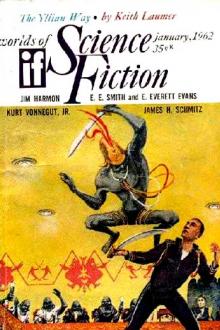Bat Wing by Sax Rohmer (bts books to read .TXT) 📗

- Author: Sax Rohmer
Book online «Bat Wing by Sax Rohmer (bts books to read .TXT) 📗». Author Sax Rohmer
“Do you, Inspector?” asked the Scotland Yard man, quietly. “I don’t. I think it has saved the life of an innocent man.”
“What’s that? What’s that?” cried Aylesbury.
“This candle was burning here on the yew tree,” explained Harley, “at the time that you looked out of the window of the hut. You could not see it. You could not see it from the crest adjoining the Guest House—the only other spot in the neighbourhood from which this garden is visible. Now, since the course of a bullet is more or less straight, and since the nature of the murdered man’s wound proves that it was not deflected in any way, I submit that the one embedded in the yew tree before you could not possibly have been fired from the Guest House! The second part of my experiment, gentlemen, will be designed to prove from whence it was fired.”
CHAPTER XXXIII. PAUL HARLEY’S EXPERIMENT CONCLUDED
Up to the very moment that Paul Harley, who had withdrawn, rejoined us in the garden, Inspector Aylesbury had not grasped the significance of that candle burning upon the yew tree. He continued to stare at it as if hypnotized, and when my friend re-appeared, carrying a long ash staff and a sheet of cardboard, I could have laughed to witness the expression upon the Inspector’s face, had I not been too deeply impressed with that which underlay this strange business.
Wessex, on the other hand, was watching my friend eagerly, as an earnest student in the class-room might watch a demonstration by some celebrated lecturer.
“You will notice,” said Paul Harley, “that I have had a number of boards laid down upon the ground yonder, near the sun-dial. They cover a spot where the turf has worn very thin. Now, this garden, because of its sunken position, is naturally damp. Perhaps, Wessex, you would take up these planks for me.”
Inspector Wessex obeyed, and Harley, laying the ash stick and cardboard upon the ground, directed the ray of an electric torch upon the spot uncovered.
“The footprints of Colonel Menendez!” he explained. “Here he turned from the tiled path. He advanced three paces in the direction of the sun-dial, you observe, then stood still, facing we may suppose, since this is the indication of the prints, in a southerly direction.”
“Straight toward the Guest House,” muttered Inspector Aylesbury.
“Roughly,” corrected Harley. “He was fronting in that direction, certainly, but his head may have been turned either to the right or to the left. You observe from the great depth of the toe-marks that on this spot he actually fell. Then, here”—he moved the light—“is the impression of his knee, and here again—”
He shone the white ray upon a discoloured patch of grass, and then returned the lamp to his pocket.
“I am going to make a hole in the turf,” he continued, “directly between these two footprints, which seem to indicate that the Colonel was standing in the military position of attention at the moment that he met his death.”
With the end of the ash stick, which was pointed, he proceeded to do this.
“Colonel Menendez,” he went on, “stood rather over six feet in his shoes. The stick which now stands upright in the turf measures six feet, from the chalk mark up to which I have buried it to the slot which I have cut in the top. Into this slot I now wedge my sheet of cardboard.”
As he placed the sheet of cardboard in the slot which he had indicated, I saw that a round hole was cut in it some six inches in diameter. We watched these proceedings in silence, then:
“If you will allow me to adjust the candle, gentlemen,” said Harley, “which has burned a little too low for my purpose, I shall proceed to the second part of this experiment.”
He walked up to the yew tree, and by means of bending the nail upward he raised the flame of the candle level with the base of the embedded bullet.
“By heavens!” cried Wessex, suddenly divining the object of these proceedings, “Mr. Harley, this is genius!”
“Thank you, Wessex,” Harley replied, quietly, but nevertheless he was unable to hide his gratification. “You see my point?”
“Certainly.”
“In ten minutes we shall know the truth.”
“Oh, I see,” muttered Inspector Aylesbury; “we shall know the truth, eh? If you ask me the truth, it’s this, that we are a set of lunatics.”
“My dear Inspector Aylesbury,” said Harley, good humouredly, “surely you have grasped the lesson of experiment number one?”
“Well,” admitted the other, “it’s funny, certainly. I mean, it wants a lot of explaining, but I can’t say I’m convinced.”
“That’s a pity,” murmured Wessex, “because I am.”
“You see, Inspector,” Harley continued, patiently, “the body of Colonel Menendez as it lay formed a straight line between the sun-dial and the hut in the garden of the Guest House. That is to say: a line drawn from the window of the hut to the sun-dial must have passed through the body. Very well. Such an imaginary line, if continued beyond the sun-dial, would have terminated near the base of the seventh yew tree. Accordingly, I naturally looked for the bullet there. It was not there. But I found it, as you know, in the ninth tree. Therefore, the shot could not possibly have been fired from the Guest House, because the spot in the ninth yew where the bullet had lodged is not visible from the Guest House.”
Inspector Aylesbury removed his cap and scratched his head vigorously.
“In order that we may avoid waste of valuable time,” said Harley, finally, “let us take a hasty observation from here. As a matter of fact, I have done so already, as nearly as was possible, without employing this rough apparatus.”
He knelt down beside the yew tree, lowering his head so that the candlelight shone upon the brown, eager face, and looked upward, over the top of the sun-dial and through the hole in the cardboard.
“Yes,” he muttered, a note of rising excitement in his voice. “As I thought, as I thought. Come, gentlemen, let us hurry.”
He walked rapidly out of the garden, and up the steps, whilst we followed dumb with wonder—or such at any rate was the cause of my own silence.
In the hall Pedro was standing, a bunch of keys in his hand, and evidently expecting Harley.
“Will you take us by the shortest way to the tower stairs?” my friend directed.
“Yes, sir.”
Doubting, wondering, scarcely knowing whether to be fearful or jubilant, I followed, along a carpeted corridor, and thence, a heavy, oaken door being





Comments (0)